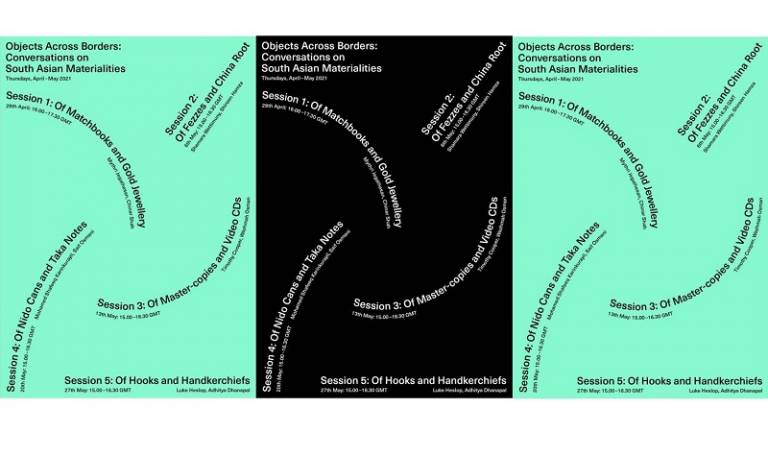VIRTUAL CSSA: Of Master-copies and Video CDs
13 May 2021, 3:00 pm–4:30 pm

Part of the 'Objects Across Borders' series, reflecting on the stories embedded in visual and material artefacts, we are pleased to present Timothy Cooper and Wazhmah Osman.
This event is free.
Event Information
Open to
- All
Availability
- Yes
Cost
- Free
Organiser
-
Centre for the Study of South Asia and the Indian Ocean World
Timothy Cooper
Object: Master-copy
The object examined is an audiocassette of popular music from north-western Pakistan whose circuitous routes took it from Afghanistan to the United Arab Emirates. No longer sold to the public, the cassette is now used as a master-copy by an Afghan store-holder in the Emirate of Sharjah who has traded in Pashto-language film and music for the last three decades. A master-copy is a print made in close proximity to a particular carrier– such as a celluloid film, an audiocassette, or a vinyl record – considered to be the earliest or most unblemished recording extant. It plays a central role in the preservation of audio-visual media through its dispersal across platforms and carriers. By building a repertoire of master-copies traders also established successful businesses in the Gulf, selling copied material to the large community of expatriate labourers residing there. I also consider some of its interfaces, from a photocopied cover of a CD, itself a copy of the audiocassette from which it is transferred, to glitch-ridden VCD copies of Pashto films.
Wazhmah Osman
Object: Video CD
Based on my ethnographic research in Afghanistan and its neighboring countries, the object I examine is the Video CD, and more broadly, the circulation of South Asian dramatic serials and female driven B-movies that feature strong villainesses and heroines. During my fieldwork I discovered that women media makers and audiences were challenging the prevailing white savior lexicon by producing and viewing dramatic serials and B-movies produced in India, Pakistan, and Afghanistan. While the genres of dramatic serials or soap operas and B-movies have been critiqued by some for perpetuating regressive gender and sexuality roles, in this presentation I highlight the ways that new productions of them offer a subversive space.
Part of the Objects Across Borders series, bringing together scholars and creative practitioners working in and on South Asia to reflect on the stories embedded in visual and material artefacts. This series is organised by Vindhya Buthpitiya (UCL) and Mallika Leuzinger (Princeton) and hosted by the UCL Centre for the Study of South Asia and the Indian Ocean World, and The Fung Global Fellows Program and Program in South Asian Studies at Princeton University.
About the Speakers
Dr. Timothy Cooper
Postdoctoral Fellow at the Department of Social Anthropology at University of Cambridge
Cooper is an anthropologist of religion, media, and the moving image, with a regional focus on contemporary Pakistan. Cooper is currently a research associate at the Max Planck Cambridge Centre for Ethics, Economy, and Social Change. He has disseminated his research in numerous publications and impact projects, including the organisation of a major international retrospective on Pakistani film at the British Film Institute and the production of four ethnographic films screened at international festivals. He is currently working on a book manuscript, titled By Popular Demand: Moral Atmosphere in a Pakistani Marketplace.
More about Dr. Timothy CooperDr Wazhmah Osman
Assistant professor in Media Studies and Production at Temple University
She is an Afghan-American academic and filmmaker. Her research and teaching are rooted in feminist media ethnographies that focus on the political economy of global media industries and the regimes of representation and visual culture they produce. In her recent work she extends these critical inquiries to the politics of representation and visual culture of "The War On Terror“ including gender/sexuality discourses and how they reverberate globally and locally. In Television and the Afghan Culture Wars: Brought to You by Foreigners, Warlords, and Activists (2020), she analyzes the impact of international funding and cross-border media flows on the national politics of Afghanistan, the region, and beyond. Wazhmah also has over a decade in television and film production for major American and international media institutions. Her critically acclaimed documentary films have screened in diverse venues, ranging from human rights organizations to national and international film festivals.
More about Dr Wazhmah Osman Close
Close

